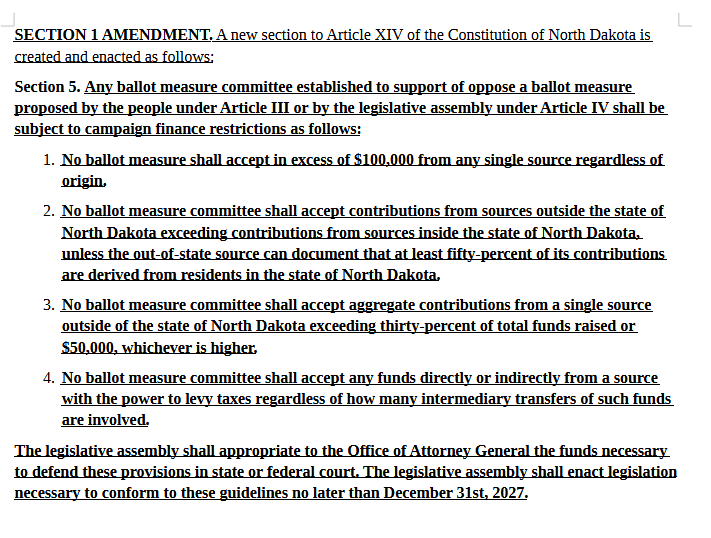This morning, the House Government and Veterans Affairs committee heard testimony on HCR 3003, which I previewed earlier this week:
Will Legislators Ever Respect The Constitutional “Powers Reserved To The People”?
Much of the premise of HCR 3003 is the need to protect the sacredness of the constitution and that to do that, the process needs to be made harder.
But that mentality does not seem to apply to Article III of the North Dakota Constitution itself - which is titled “POWERS RESERVED TO THE PEOPLE”.
Every 2-4 years when the legislature gives the voters a chance to vote away their own rights, a fundamental question pops up: does North Dakota’s constitution even matter?
There seems to be a perpetual disagreement on what the word “reserved” means. Most legislators seem to think that they get to decide to what extent “the powers reserved to the people” exist.
Someday, this problems will be addressed, perhaps with another attempt at what was started in 2019 but not finished.
Article III’s “powers reserved to the people” is also an extension of Article I of North Dakota’s constitution is titled “Declaration of Rights”.
Article I Section 2. All political power is inherent in the people. Government is instituted for the protection, security and benefit of the people, and they have a right to alter or reform the same whenever the public good may require.
Article I Section 5. The citizens have a right, in a peaceable manner, to assemble together for the common good, and to apply to those invested with the powers of government for the redress of grievances, or for other proper purposes, by petition, address or remonstrance.
In an ideal world, our elected representatives would simply respect the fact their voters set the terms and conditions by which they operate and leave the “Powers Reserved To The People” alone.
But as recent and extensive history has shown, every election that results in a ballot measure passing that legislators don’t like, results in another attack on the “Powers Reserved To The People”.
The measures that legislators don’t like come from both sides of the ideological isle.
Things like: the medical marijuana and Marsy’s Law in 2016, ethics commission in 2018, the attempted follow-up to the ethics commission in 2020, legislative term limits in 2022, and the latest attempt to abolish property taxes in 2024 - are all examples of initiated constitutional measures that the legislature wish did not exist. Yet, the existence of these measures is a direct reflection of the legislature failing to address issues their own constituents are concerned about.
Urging Legislators To Do The Right Thing
In my testimony I outlined the two paths the legislature could go down.
The first of which was literally telling the committee how to make the measure easier to pass, and harder for me to fight against.
The second path is to actually solve the problems most people agree exist, rather than just making the process harder..
Mr. Chairman and Members of the Committee,
If this committee and the legislature insist of continuing to ask the voters over and over to make the initiated measure process more difficult; and if this is to be the vehicle this session, I would like to suggest the following:
***The Undemocratic Hypocrisy, And A Solution***
When this idea comes up, it is never discussed that it hinges on the notion that the current system, a simple majority of 50%+1 can increase future thresholds to 60% - and that that is inherently unfair and undemocratic.
As has been said in the past, if the legislature would like to increase the threshold to 60%, they should make their own change subject to a 60% threshold.
Because the process for ballot measures is protected by Article II of the constitution entitled “Powers Reserved To The People”, the people should first be asked whether they want the legislature to even have the power to ask them to raise the threshold for all constitutional measures.
This could be done by implementing a two-step process:
In the June election: Ask the voters to require all future changes to the Article III constitutional measure process be subject to a 60% threshold.
Then, if the voters again, in November: Ask the voters to change the threshold to 60%, once the threshold for such changes is itself raised.
If the required threshold to increase the requirement to 60% was itself first set at 60%, it would be very difficult for myself or anyone else to say it was an unfair legislative power grab.
But, if 50%+1 can decide that in the future changes require 60%, that means that a full 10% of voters have been disenfranchised in the process of making the change itself.
Why doesn’t the legislature seek an actual solution to this problem rather than cutting 10% of voters out of the process?
If this committee would like to address the problems with the initiated measure process that most people, including supporters and defenders of the existing process agree need to be addressed, here are some solutions:
***Alternative Reforms To Initiated Measure Process***
North Dakota’s initiated measure process allows The People to set the terms and conditions for their own government.
Those of us who consistently defend the initiated measure process are constantly told we are against every suggested change. It’s not true, since those that use the process know the flaws better than anyone.
I have included sample language for three concepts in case any legislators want to run with one or more of these reform concepts.
Reform Concept #1: Enables and requires the legislature to fund a digital signature system on the Secretary of State website, while leaving the paper option in place due to technical difficulties.
Reason: To modernize the initiated measure process, and to reduce the need to hundreds of thousands of dollars to get measures on the ballot.
Sample Language:
Reform Concept #2: Grants sponsoring committees to direct access to legislative council drafting and legal services, and creates a “seal of approval” of measures that are written/vetted by legislative council.
Reason: To promote the placement of better language on the ballot.
Sample Language:
Reform Concept #3: Addresses campaign finance of ballot measures in a way that places out of state financial influence on an equal playing field with in-state financial influence. Ends the ability for tax dollars to be privatized through associations in support or opposition of ballot measures.
Reason: North Dakota should protect its sovereignty as much as possible from outside interference without suppressing the free speech rights of non-residents. Also, government entities that are otherwise prohibited from spending money on campaign activities should not be able to contribute to organizations that can.
Sample Language:
Legislators who want to address the problems with ballot measures rather than just trying to make them more difficult would discuss these concepts as potential solutions.
Citizens: you can contact your legislators by clicking here, and letting them know you support fixing the problem of out-of-state money and interests but oppose making the process harder for North Dakotans, by telling them to vote NO on HCR 3003, but to pursue actual solutions by amending the resolution.
















Share this post